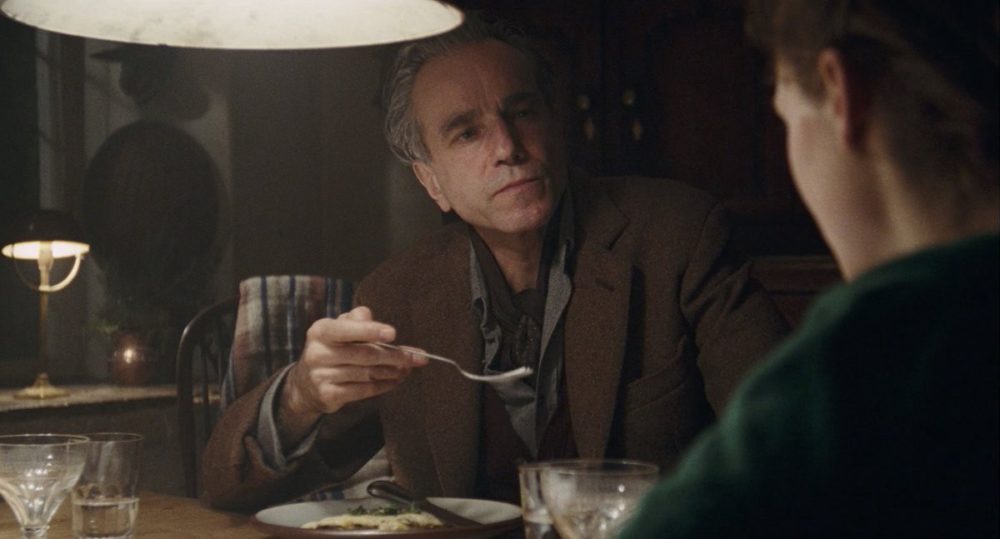
Reynolds Woodcock, the meticulous master craftsman at the core of Phantom Thread, lives a sort of double life. That isn’t to say that he puts on a mask and goes around fighting crime, but the ways that Woodcock lives, in public and private, are two sides of him that are opposed to one another. These different sides are related to the idea of control; the things that he wants or needs control over in a public sphere, compared to what he surrenders control over in private.
This control is related to Woodcock’s work as a dressmaker, where everything needs to be done in an exacting, picture-perfect manner, both for his clients, and the reputation of his house. Even when he’s simply sitting having breakfast, everything is just so, everything orbits around the sun that is Reynolds Woodcock. His sister Cyril and muse/lover Alma, are willing to be silent because he requires it, are willing to allow him to keep things moving in exactly the way that he desires. In simple terms: in public, Reynolds Woodcock is in control of everything, domestically and professionally. But Phantom Thread is more than a simple portrait of a “difficult man,” the women in Reynolds’s life are richly drawn and dynamic, at once independent from him and permanently bound to him. This is what allows the film to grapple so gracefully with ideas of control, co-dependence, and submission. The question of whether or not Reynolds’s control is something that comes directly from him, or that it’s something those around him are willing to allow, is one of the key things that animates the divide of dominance and submission that runs through Phantom Thread.
The extent to which Reynolds really has any control over those around him is thrown into flux through his relationship with Alma. She serves as his muse in their strange relationship, with work and love permanently entwined when the two of them are together. Reynolds designs a dress for Alma, which seems like the main way in which he can express his affection: through his craft, through something that he can control. If Reynolds can’t control his emotions, then he’ll try and control everything else. He refuses to go to a New Year’s party with Alma, opting instead to stay home and work, staying in an environment that can understand, and keep moving in a way that is comfortable to him. His control seems to come from his outward strength, so when he becomes ill or weak, his control wanes. This idea of an interplay between weakness and strength creates a sense of co-dependence between the couple; one needs the other to be weak in order for them to be strong. This feels like an echo of similar themes in The Master; Lancaster and Freddie find themselves entangled in a similar web of control, submission, and sexuality. In both The Master and Phantom Thread, power becomes something shared through a co-dependent relationship, as if there’s only so much of it to go around, and it can only be in one person’s hands at any given time.
Reynolds’s weakness literally comes from Alma. Not from her presence in his life, but from the things that she gives him. Late in the film, she poisons him, and when he is lying in bed, suffering through visions of his deceased mother, he finds himself, willingly or not, giving up control of his life to Alma. Sickness and weakness somehow allow Reynolds to recharge, they let him refocus on work, and give him a window into a different part of himself; a part that can live with someone on what might be equal terms, an understanding that not everything needs to be done according to the exact tenets of his routines and ideals. The question of if Alma is really in control is, of course, one worth considering, just like Reynolds’s own control seems precarious. Whether or not Alma is actually in control, or if Reynolds is forced to submit, is never made clear. But the answer to the question isn’t important; what matters is the way that it changes the dynamic of their relationship, and the nature of Reynolds’s submission shows the ways in which he differs in public and private spheres.
While the romantic relationship between Reynolds and Alma is never shown to be explicitly sexual, the nature of their dynamic makes it impossible to divorce their pairing from ideas of sexuality. The nature of Reynolds’s submission initially seems as something that he’s forced into, but in the film’s final moments, his desire to submit is made explicitly clear. Alma reveals to Reynolds that she’s poisoned him, that she wants him to be weak. But his submission is not inherently an act of weakness, and when he says to Alma “kiss me my love, before I’m sick,” it comes out as a sort of declaration, a moment of acknowledging that this is, in a way that feels perfect for the strange, mannered world of Phantom Thread, something that he needs.



 Derek
Derek
 Isabelle
Isabelle